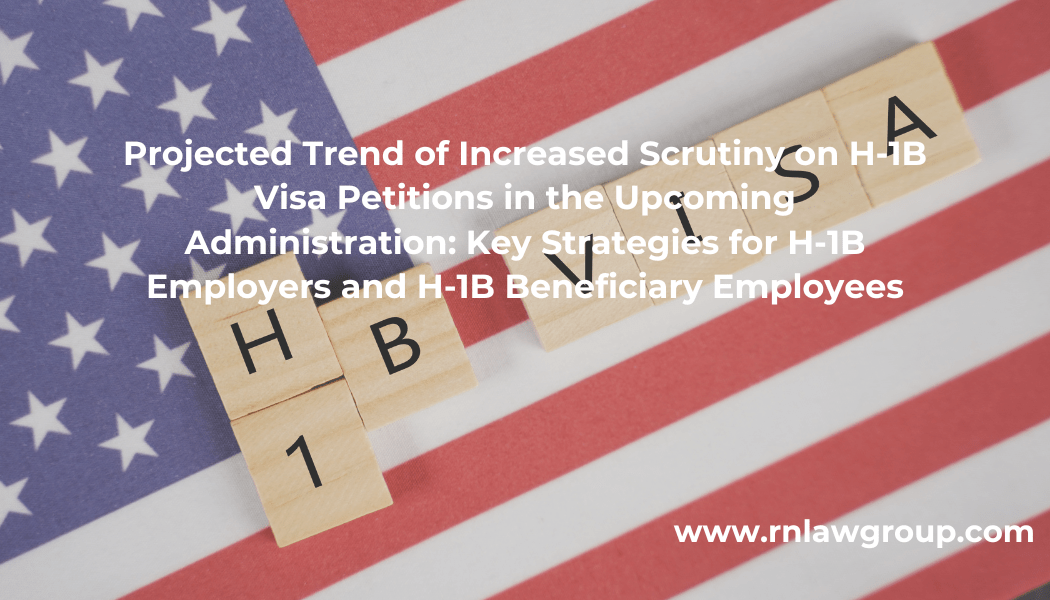
Projected Trend of Increased Scrutiny on H-1B Visa Petitions in the Upcoming Administration: Key Strategies for H-1B Employers and H-1B Beneficiary Employees
As the United States anticipates shifts in immigration policy under the incoming administration of President-Elect Trump, stakeholders in the H-1B program should prepare for potential changes that could influence eligibility and adjudication processes. It is essential to understand proactive strategies for addressing anticipated challenges, including stricter specialty occupation standards, potential modifications to the lottery system, wage level requirements, and more rigorous documentation demands. By taking a strategic approach, employers and H-1B employees can better navigate the evolving landscape of the H-1B visa program.
Monitor Policy Changes
Staying updated on immigration policies is critical to adapting to evolving requirements.
- Employers: Regularly consult trusted immigration news platforms, USCIS announcements, and industry-specific legal updates. For example, changes to the H-1B lottery, prioritizing higher wages or advanced degrees, could shift hiring strategies.
- Employees: Follow developments on eligibility criteria, documentation expectations, and alternative visa pathways. Staying informed allows you to prepare adequately and avoid last-minute challenges.
By keeping an eye on changes, you can ensure that your Petition strategy aligns with current regulations.
Enhance Documentation
Thorough documentation is the cornerstone of successful H-1B petitions, particularly under heightened scrutiny.
- Employers: Provide exhaustive job descriptions detailing the specialized knowledge required for the role. Include evidence like industry reports, academic references, and examples of complex tasks performed by similar professionals in your field.
- Employees: Gather transcripts, certifications, and a portfolio of work that demonstrates the link between your education and the job requirements. For instance, IT professionals could showcase certifications in cloud computing, DevOps, or specialized tools relevant to their roles.
A comprehensive file with clearly articulated evidence can preempt requests for evidence (RFEs) or denials.
Work with Experts
Immigration attorneys and consultants specializing in H-1B filings can offer tailored advice, addressing nuances in policy interpretation and procedural requirements.
- For Employers: Legal counsel can help structure petitions to withstand scrutiny, particularly for challenging cases like Level 1 wage roles or third-party placements. They can also assist in preparing contracts and other critical documentation.
- For Employees: Attorneys can ensure your credentials align with job requirements and guide you through the appeal process if needed. They may also suggest alternatives, such as O-1 visas for individuals with extraordinary abilities.
Expert guidance ensures that both employers and employees are fully prepared for the complexities of the process.
Adapt to Lottery Changes
If merit-based selection prioritizes higher wages or advanced qualifications, employers and Employees must adjust their strategies accordingly. We will also see an increased registration fee regardless if the shift to merit-based selection prioritizations occur.
- Employers: Consider revising wage structures to better align with priority levels, particularly for roles critical to your organization. Offering competitive wages can improve your petition’s chances.
- Employees: Advanced degree holders should emphasize their qualifications to gain an advantage under potential new lottery criteria. Highlighting your expertise in niche or high-demand fields, such as data science or cybersecurity, could also strengthen your case.
Being proactive about wage offerings and qualifications positions you favorably within the lottery system.
Strengthen Evidence for Specialty Occupation Criteria
Demonstrating how a position meets specialty occupation requirements is increasingly important.
- Employers: Include detailed job descriptions, focusing on complex tasks and specialized knowledge. Use industry benchmarks to illustrate how similar roles require advanced education.
- Employees: Relate your academic background to specific job responsibilities. For example, an engineering graduate could highlight coursework or projects directly relevant to the role.
Providing clear, undeniable links between the job and the educational requirement helps establish your case as a specialty occupation.
Document Wage Level Justifications
Wage levels, particularly Level 1 wages, are often scrutinized under the premise that they may not reflect the advanced knowledge expected in specialty occupations.
- Employers: Justify Level 1 wage roles by outlining how entry-level tasks still require specialized skills. For instance, entry-level software developers might need proficiency in languages like Python or experience in frameworks like AWS, proving the complexity of their responsibilities.
- Employees: Highlight the real-world complexity of tasks associated with your position. If applicable, include certifications or professional development courses as evidence of ongoing specialization.
Providing strong justifications can help mitigate skepticism surrounding wage levels.
Bolster Employer-Employee Relationship Proof
Roles involving third-party placements are often questioned regarding the employer’s control over the employee’s work.
- Employers: Supply contracts, detailed project plans, and evidence of oversight mechanisms like regular status meetings or performance evaluations. Establish clear reporting lines and supervisory protocols.
- Employees: Maintain records of communication with your employer, such as work reports, emails, or updates showing accountability and engagement.
Solidifying evidence of the employer-employee relationship can safeguard against RFEs or denials.
Leverage Educational and Professional Credentials
Advanced degrees and certifications can differentiate your Petition, particularly if lottery criteria emphasize these factors.
- Employers: Prioritize hiring candidates with advanced degrees or certifications relevant to your field. Highlight their expertise in the petition to demonstrate their unique contributions.
- Employees: Showcase how your advanced training, whether through a master’s degree or certifications in specialized tools, adds value to the organization.
By leveraging educational and professional achievements, you improve your chances of selection and approval.
Evaluate Alternative Visa Options
If policy changes make H-1B visas less accessible, consider exploring other visa categories.
- For Employers: Investigate O-1 visas for exceptional talent, L-1 visas for intracompany transfers, or even OPT extensions for recent graduates.
- For Employees: Research pathways like the EB-2 NIW (National Interest Waiver) for advanced degree professionals or H-4 EAD for spouses of H-1B holders.
Diversifying your visa strategy can provide valuable alternatives if the H-1B process becomes more restrictive.
Conclusion
Adapting to potential changes in H-1B policies requires proactive planning, thorough documentation, and a strategic approach. Employers and H-1B employees must stay informed about policy developments, focus on demonstrating the specialized nature of roles, and prepare detailed evidence to meet USCIS requirements. Changes to the H-1B lottery system, wage-level scrutiny, and documentation standards highlight the growing complexity of the process.
Given these challenges, the guidance of an experienced immigration attorney is essential. Attorneys provide tailored advice, ensuring compliance with evolving regulations and enhancing the likelihood of approval. They also help anticipate potential issues, develop strong application strategies, and explore alternative immigration pathways if needed.
By combining proactive measures with professional expertise, employers and applicants can confidently navigate the changing H-1B landscape and position themselves for success in securing this critical visa.
Reddy Neumann Brown PC located in Houston, Texas, has been serving the business community for over 27 years and is Houston’s largest immigration law firm focused solely on U.S. Employment-based immigration. We work with employers, employees and investors helping them navigate the immigration process quickly and cost-effectively.
By: Jeanetly Garcia
Jeanetly Garcia advises employers and individuals through all phases of the non-immigrant visa process. As an attorney in the H-1B Department at Reddy Neumann Brown PC she is experienced in filing nonimmigrant petitions and applications for immigrant benefits, as well as, responding to USCIS issued requests for evidence concerning an array of legal issues.

